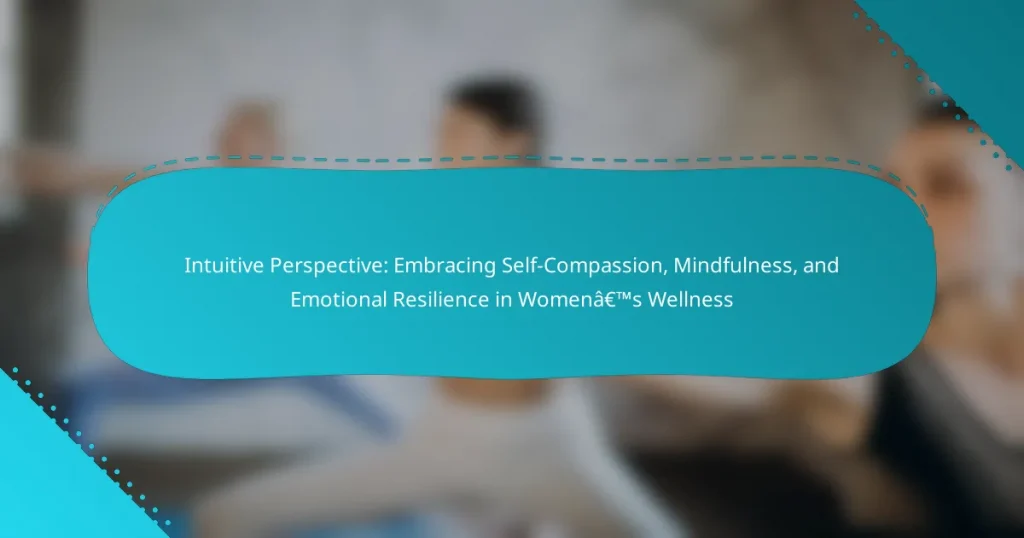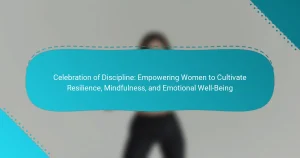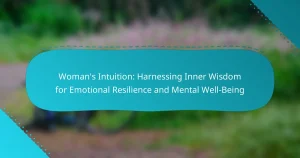Embracing self-compassion, mindfulness, and emotional resilience is vital for women’s wellness. This article explores how self-compassion enhances mental health, the role of mindfulness in fostering emotional resilience, and practical strategies for integrating these practices into daily life. Understanding the unique challenges women face can empower them to navigate difficulties while promoting a healthier mindset.
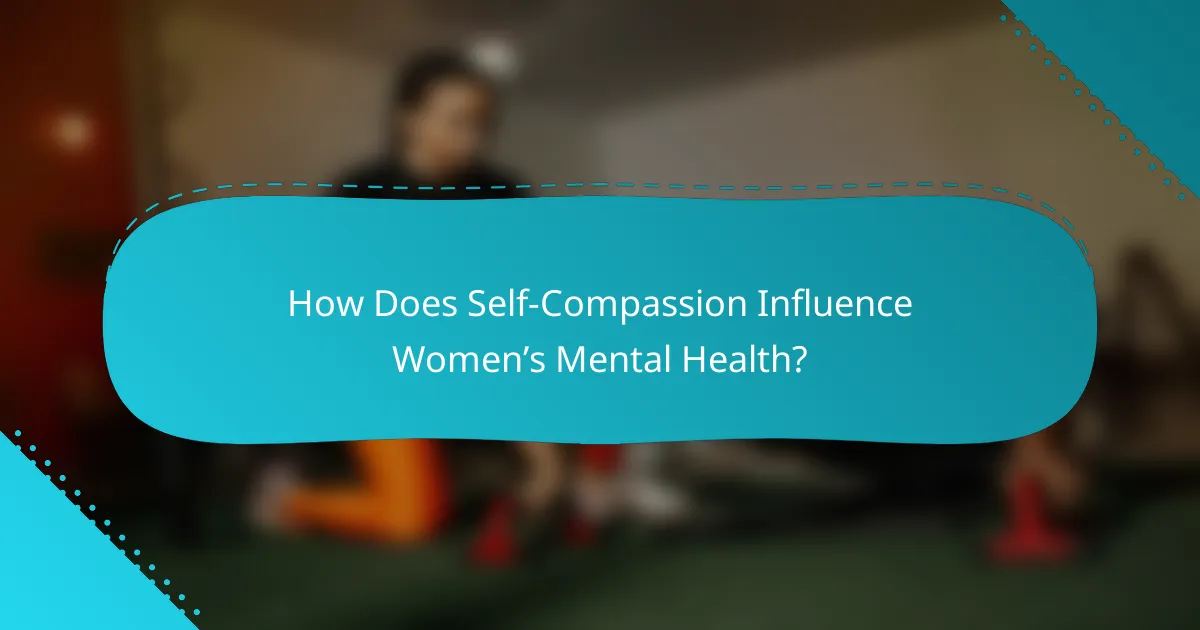
How Does Self-Compassion Influence Women’s Mental Health?
Self-compassion significantly enhances women’s mental health by fostering emotional resilience and mindfulness. This approach encourages a supportive inner dialogue, reducing anxiety and depression. Research shows that women who practice self-compassion report higher life satisfaction and lower levels of stress. Self-compassionate individuals are more likely to engage in positive coping strategies, leading to improved overall well-being. Embracing self-compassion empowers women to navigate challenges with greater ease and promotes a healthier mindset.
What Are the Key Components of Self-Compassion?
Self-compassion consists of three key components: self-kindness, common humanity, and mindfulness. Self-kindness involves treating oneself with care and understanding during difficult times. Common humanity recognizes that suffering and personal inadequacy are part of the shared human experience. Mindfulness entails maintaining a balanced awareness of negative emotions without over-identifying with them. These elements collectively foster emotional resilience and enhance overall well-being in women’s wellness.
How Can Self-Compassion Be Cultivated in Daily Life?
Self-compassion can be cultivated daily through intentional practices. Start by practicing mindfulness, which helps you to become aware of your thoughts and feelings without judgment. Incorporate self-kindness by treating yourself with the same care you would offer a friend. Engage in reflective journaling to explore your emotions and challenges, fostering emotional resilience. Lastly, establish a supportive community that encourages open conversations about self-compassion and wellness. These practices create a nurturing environment for personal growth and emotional health.
What Practices Enhance Self-Compassion?
Practices that enhance self-compassion include mindfulness meditation, self-kindness exercises, and journaling. These practices foster emotional resilience and promote a positive self-view. Mindfulness meditation encourages present-moment awareness, reducing negative self-talk. Self-kindness exercises involve treating oneself with the same care as a friend, fostering a supportive inner dialogue. Journaling allows for reflection on feelings and experiences, enhancing self-understanding. Engaging in these practices consistently can lead to improved mental well-being and emotional strength.
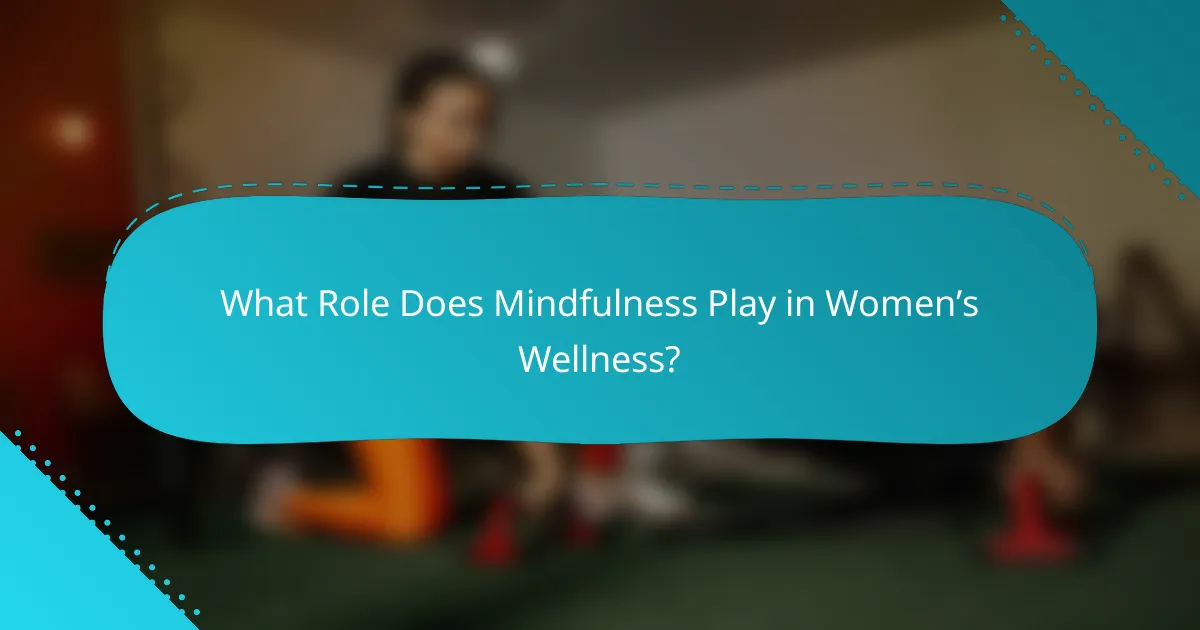
What Role Does Mindfulness Play in Women’s Wellness?
Mindfulness significantly enhances women’s wellness by fostering self-compassion and emotional resilience. It encourages awareness of thoughts and feelings, promoting mental clarity and reducing stress. Research indicates that mindfulness practices can lead to improved emotional regulation, which is crucial for overall well-being. Women who engage in mindfulness report greater life satisfaction and lower levels of anxiety. Incorporating mindfulness into daily routines can empower women to embrace their experiences and cultivate a healthier mindset.
How Can Mindfulness Improve Emotional Resilience?
Mindfulness significantly enhances emotional resilience by fostering self-compassion and reducing stress. Practicing mindfulness allows women to acknowledge their emotions without judgment, leading to better emotional regulation. Research indicates that mindfulness meditation can decrease anxiety and improve overall well-being, which are crucial for resilience. By cultivating a present-focused mindset, women can develop stronger coping strategies and face challenges with greater confidence.
What Mindfulness Techniques Are Most Effective for Women?
Mindfulness techniques most effective for women include self-compassion practices, mindful breathing, and body scan meditations. These techniques enhance emotional resilience and promote overall wellness. Self-compassion practices help women cultivate kindness towards themselves, reducing negative self-talk. Mindful breathing encourages relaxation and stress reduction, while body scan meditations increase awareness of physical sensations and promote acceptance. Incorporating these techniques can lead to improved mental health and emotional balance.
How to Implement Mindfulness in Stressful Situations?
To implement mindfulness in stressful situations, focus on self-compassion and emotional resilience. Begin by taking deep breaths to center yourself. Acknowledge your feelings without judgment, allowing space for self-acceptance. Practice grounding techniques, such as focusing on your senses, to remain present. Regularly reflect on your responses to stress, fostering a mindset of growth and understanding. Incorporating these practices enhances overall wellness and emotional stability.
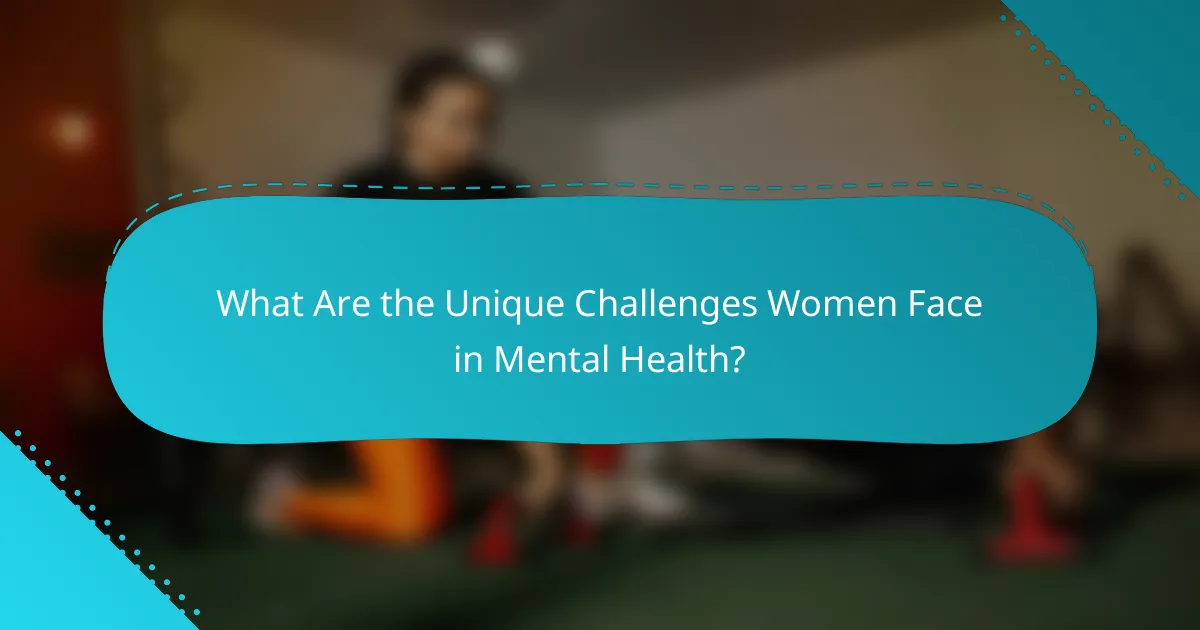
What Are the Unique Challenges Women Face in Mental Health?
Women face unique challenges in mental health, including societal pressures, stigma, and biological factors. These elements can hinder their emotional resilience and self-compassion. Research indicates that women are more likely to experience anxiety and depression, often exacerbated by the demands of caregiving and work-life balance. Mindfulness practices can enhance emotional resilience, providing women with tools to navigate these challenges effectively. Embracing self-compassion is essential for fostering mental well-being, allowing women to acknowledge their struggles without judgment.
How Do Hormonal Changes Affect Women’s Mental Wellness?
Hormonal changes significantly impact women’s mental wellness by influencing mood, stress levels, and emotional resilience. Fluctuations in hormones, particularly during menstrual cycles, pregnancy, and menopause, can lead to increased anxiety and depression. Embracing self-compassion and mindfulness helps mitigate these effects. Studies show that mindfulness practices can enhance emotional regulation, promoting resilience against stressors. Women who cultivate emotional resilience through supportive practices report improved mental health. Fostering these attributes can empower women to navigate hormonal changes with greater ease and well-being.
What Societal Pressures Impact Women’s Emotional Health?
Societal pressures significantly impact women’s emotional health by fostering unrealistic expectations. Factors such as beauty standards, career demands, and relationship roles contribute to stress and anxiety. Research indicates that 76% of women feel societal pressure to meet these ideals, leading to diminished self-esteem. Embracing self-compassion, mindfulness, and emotional resilience can counteract these effects, promoting overall wellness and mental health.
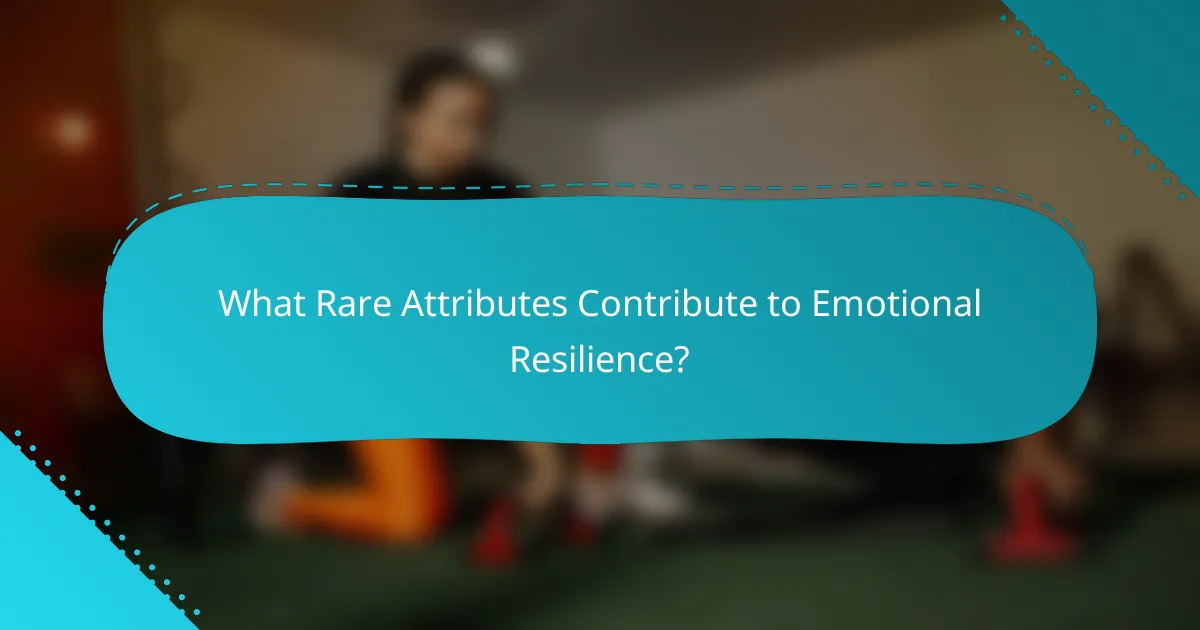
What Rare Attributes Contribute to Emotional Resilience?
Emotional resilience in women can be enhanced through rare attributes such as deep self-awareness, adaptive flexibility, and authentic connection. These qualities enable women to navigate challenges effectively. Deep self-awareness allows for recognizing emotions and triggers, fostering better emotional regulation. Adaptive flexibility promotes a willingness to adjust perspectives and strategies in response to changing circumstances. Authentic connection nurtures supportive relationships, which are vital for emotional stability. Together, these rare attributes contribute significantly to building a robust emotional resilience framework.
How Can Personal Narratives Foster Resilience?
Personal narratives can significantly enhance resilience by promoting self-compassion and mindfulness. Sharing experiences fosters emotional connections and provides insights into overcoming challenges. This process encourages women to reflect on their strengths and cultivate a supportive community. Research indicates that storytelling can improve mental well-being and help individuals navigate stress effectively. Embracing personal narratives allows for greater emotional resilience, enabling women to face adversity with confidence and compassion.
What Role Does Community Support Play in Building Resilience?
Community support is crucial for building resilience, particularly in women’s wellness. It fosters connection, reduces feelings of isolation, and enhances emotional well-being. Research indicates that social support can significantly improve coping strategies during stress. Women who engage in supportive communities often experience increased self-compassion and mindfulness, which are unique attributes contributing to emotional resilience. This collective strength empowers individuals to navigate challenges more effectively, creating a supportive environment that nurtures personal growth and healing.
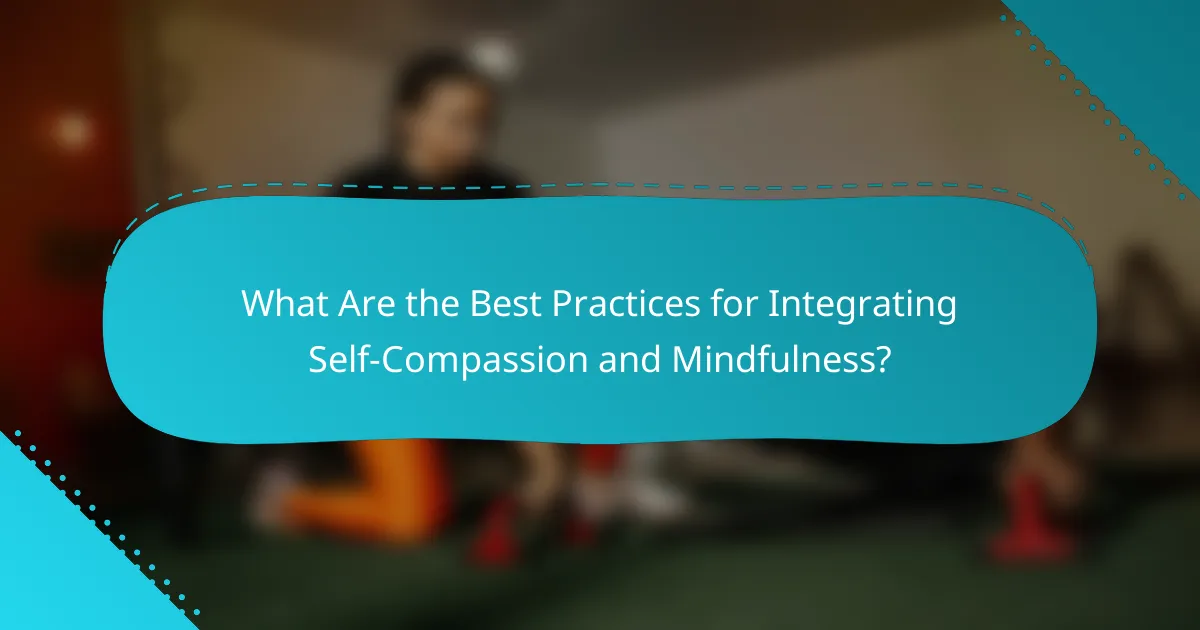
What Are the Best Practices for Integrating Self-Compassion and Mindfulness?
Practices for integrating self-compassion and mindfulness include cultivating awareness, practicing self-kindness, and fostering emotional resilience. These methods enhance women’s wellness by promoting mental clarity and reducing stress.
1. Establish a daily mindfulness routine to enhance present-moment awareness.
2. Use self-compassion exercises, such as writing a self-kind letter, to nurture emotional health.
3. Engage in guided meditations focusing on compassion to build resilience.
4. Reflect on personal experiences to identify growth opportunities, reinforcing self-acceptance.
How Can Women Create a Daily Routine for Mental Wellness?
Women can create a daily routine for mental wellness by incorporating self-compassion, mindfulness, and emotional resilience. Start each day with a brief mindfulness practice, such as meditation or deep breathing, to center your thoughts. Schedule time for self-reflection, allowing yourself to acknowledge feelings without judgment. Engage in physical activity, which boosts mood and reduces stress, and ensure you allocate moments for social connections, fostering emotional support. Prioritize adequate sleep and a balanced diet, as these are essential for mental clarity and emotional balance. Finally, set achievable goals and celebrate small victories, reinforcing self-compassion and resilience.
What Common Mistakes Should Be Avoided When Practicing Self-Compassion?
To practice self-compassion effectively, avoid common mistakes such as self-criticism, unrealistic expectations, and neglecting emotional needs. Many women struggle with harsh self-judgment, which undermines their emotional resilience. Acknowledging feelings without judgment fosters mindfulness and enhances well-being. Additionally, overlooking the importance of self-care can lead to burnout, making it crucial to prioritize personal needs. Embracing imperfections and understanding that self-compassion is a journey rather than a destination is essential for lasting growth.
How Can Women Measure Their Progress in Emotional Resilience?
Women can measure their progress in emotional resilience through self-reflection, mindfulness practices, and tracking emotional responses. Regular journaling can help identify patterns in emotions and reactions. Mindfulness techniques, such as meditation, enhance self-awareness and promote emotional regulation. Additionally, setting specific goals related to self-compassion can provide measurable milestones. Engaging in supportive communities fosters accountability and offers external perspectives on emotional growth.
What Expert Tips Enhance Self-Compassion and Mindfulness Practices?
Practicing self-compassion and mindfulness enhances emotional resilience in women’s wellness. Start by acknowledging feelings without judgment. Incorporate daily mindfulness exercises, such as meditation or breathing techniques, to cultivate awareness. Engage in self-reflection through journaling to deepen understanding of emotions. Surround yourself with supportive communities to reinforce self-compassion practices. Prioritize self-care activities that nurture physical and emotional well-being. Embrace imperfections as part of the human experience to foster a growth mindset.
